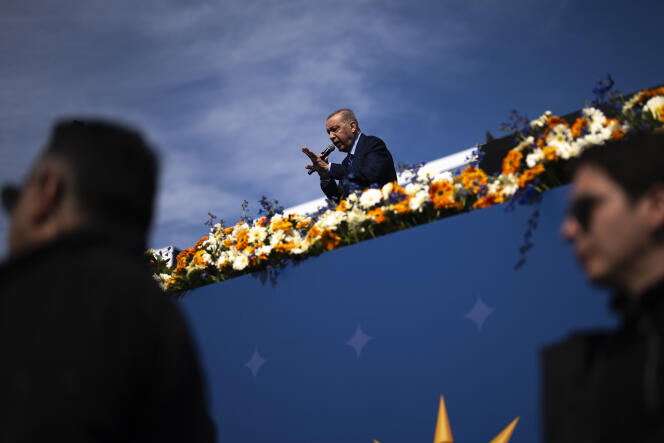


When President Recep Tayyip Erdogan took the stage at the old Atatürk Airport on Istanbul's European Side on Sunday, March 24, he didn't sound like a typical politician. After barely pronouncing the name of Murat Kurum, the candidate nominated by his party, the Justice and Development Party (AKP), to take back the metropolis from the opposition, he told the crowd: "I hope Istanbul will regain its owners this April 1," the day after the municipal elections. To the audience's "yes," he replied: "This is the city to which I have dedicated my life and to which I will devote my last breath."
Everything was said, from the outset and without too much artifice, in seemingly sincere words. Born in Istanbul and raised in one of its most working-class districts, "Tayyip bey," as his supporters call him, never truly left the city that was the springboard for his dazzling political career. Elected mayor in 1994 for a high-profile term, he kept a firm grip on the affairs and management of the megalopolis for almost 25 years with his AKP supporters, winning electoral victories until his crushing defeat in 2019 at the hands of opponent Ekrem Imamoglu, now a candidate for his own succession.
Istanbul is "the key element of the Erdogan 'brand,'" said analyst and journalist Amberin Zaman. It's a world city which, beyond its symbolic importance for the president, accounts for almost half the country's tax base and around a third of its economic output. Its governance is an invaluable source of influence for political officialdom, an important access to public and private resources. "He can afford to lose Izmir and Ankara again, which seems to be likely, but not Istanbul, where victory has become essential for him," said journalist Mehmet Altan.
The incumbent mayor, leader of the Republican People's Party (CHP), is running with a real chance of retaining his seat. So Erdogan has decided to enter the arena in the home straight. It's an opportunity for him to assume a role he's always loved: that of the leader who throws himself into the fray, harangues the crowd and challenges his current adversary to a duel, the only one capable of overshadowing him. His "dear Ekrem," as he referred to him by name for the very first time on Sunday, March 24.
Kurum, a loyal follower handpicked by the president, has never managed to break through the image of a charisma-less technocrat that has stuck to him. The former minister of urban planning and the environment, whose time in government was marked by an amnesty law regularizing substandard housing, exacerbating the consequences of the 2023 earthquake, Kurum does not inspire enthusiasm. His repeated blunders haven't helped. And, unlike his predecessors, he even remained in second place in almost all polls, despite the AKP's know-how and resources, its local network and its overwhelming media coverage.
You have 64.95% of this article left to read. The rest is for subscribers only.
